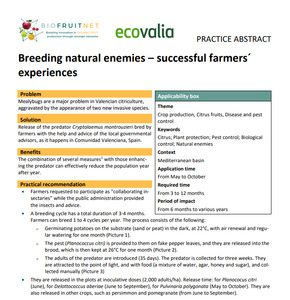{Tool} Breeding natural enemies – successful farmers´ experiences (BIOFRUITNET Practice Abstract). Creator(s): Vercher Aznar, Rosa. Issuing Organisation(s): Ecovalia - Asociación Valor Ecológico. Biofruitnet Practice Abstract, no. 089. (2022)
|
PDF
- Published Version
- English
(Breeding natural enemies – successful farmers´ experiences)
413kB | |
|
PDF
- Published Version
- Spanish/Español
(La cría de enemigos naturales experiencias de éxito)
412kB | |
![[thumbnail of 2023-09-04 13_50_24-Breeding natural enemies – successful farmers´ experiences.png]](/45001/5.hassmallThumbnailVersion/2023-09-04%2013_50_24-Breeding%20natural%20enemies%20%E2%80%93%20successful%20farmers%C2%B4%20experiences.png)  Preview |
Image (PNG)
- Cover Image
- English
119kB |
Document available online at: https://orgprints.org/45001
Summary in the original language of the document
The combination of several measures with those enhancing the predator can effectively reduce the population year after year.
Practical recommendation: 1)Farmers requested to participate as “collaborating insectaries” while the public administration provided the insects and advice. 2) A breeding cycle has a total duration of 3-4 months. Farmers can breed 1 to 4 cycles per year. The process consists of the following: a) Germinating potatoes on the substrate (sand or peat) in the dark, at 22°C, with air renewal and regular watering for one month (Picture 1). b) The pest (Planococcus citri) is provided to them on fake pepper leaves, and they are released into the brood, which is then kept at 26°C for one month (Picture 2). 3) The adults of the predator are introduced (35 days). The predator is collected for three weeks. They are attracted to the point of light, and with food (a mixture of water, agar, honey and sugar), and collected manually (Picture 3). 3) They are released in the plots at inoculative doses (2,000 adults/ha). Release time: for Planococus citri (June), for Delottococcus aberiae (June to September), for Pulvinaria polygonata (May to October). They are also released in other crops, such as persimmon and pomegranate (from June to September).
| EPrint Type: | Practice tool |
|---|---|
| Teaser: | The combination of several measures with those enhancing the predator can effectively reduce the population year after year. |
| What problem does the tool address?: | Mealybugs are a major problem in Valencian citriculture, aggravated by the appearance of two new invasive species. |
| What solution does the tool offer?: | Release of the predator Cryptolaemus montrouzieri bred by farmers with the help and advice of the local governmental advisors, as it happens in Comunidad Valenciana, Spain. |
| Country: | Spain |
| Type of Practice Tool: | Practice abstracts |
| Keywords: | Citrus, Plant protection, Pest control, Biological control, Natural enemies |
| Agrovoc keywords: | Language Value URI English Citrus http://aims.fao.org/aos/agrovoc/c_1637 English plant protection http://aims.fao.org/aos/agrovoc/c_5978 English pest control http://aims.fao.org/aos/agrovoc/c_5726 English biological control http://aims.fao.org/aos/agrovoc/c_918 English natural enemies http://aims.fao.org/aos/agrovoc/c_5085 |
| Subjects: | Crop husbandry > Production systems > Fruit and berries Crop husbandry > Crop health, quality, protection |
| Research affiliation: | European Union > Horizon 2020 > Biofruitnet Spain > Other organizations Spain European Union > Organic Farm Knowledge |
| Horizon Europe or H2020 Grant Agreement Number: | 862850 |
| Related Links: | https://organic-farmknowledge.org/tool/45001, https://biofruitnet.eu, https://organic-farmknowledge.org/tool/45003, https://archive.org/details/masscultureofcry0797fish, https://organic-farmknowledge.org/tool/45003, https://twitter.com/farm_knowledge/status/1698668763732721725, https://www.facebook.com/organicfarmknowledge/posts/pfbid033syZi8PNkMt696U15s4fN3CFATZUT3Dui7fx4tV6UQAfv8RDqC15tiXRUW5fintsl |
| Project ID: | ofk |
| Deposited By: | Basler, Andreas |
| ID Code: | 45001 |
| Deposited On: | 25 Dec 2022 10:32 |
| Last Modified: | 02 May 2024 10:32 |
| Document Language: | English, Spanish/Español |
| Status: | Published |
Repository Staff Only: item control page


